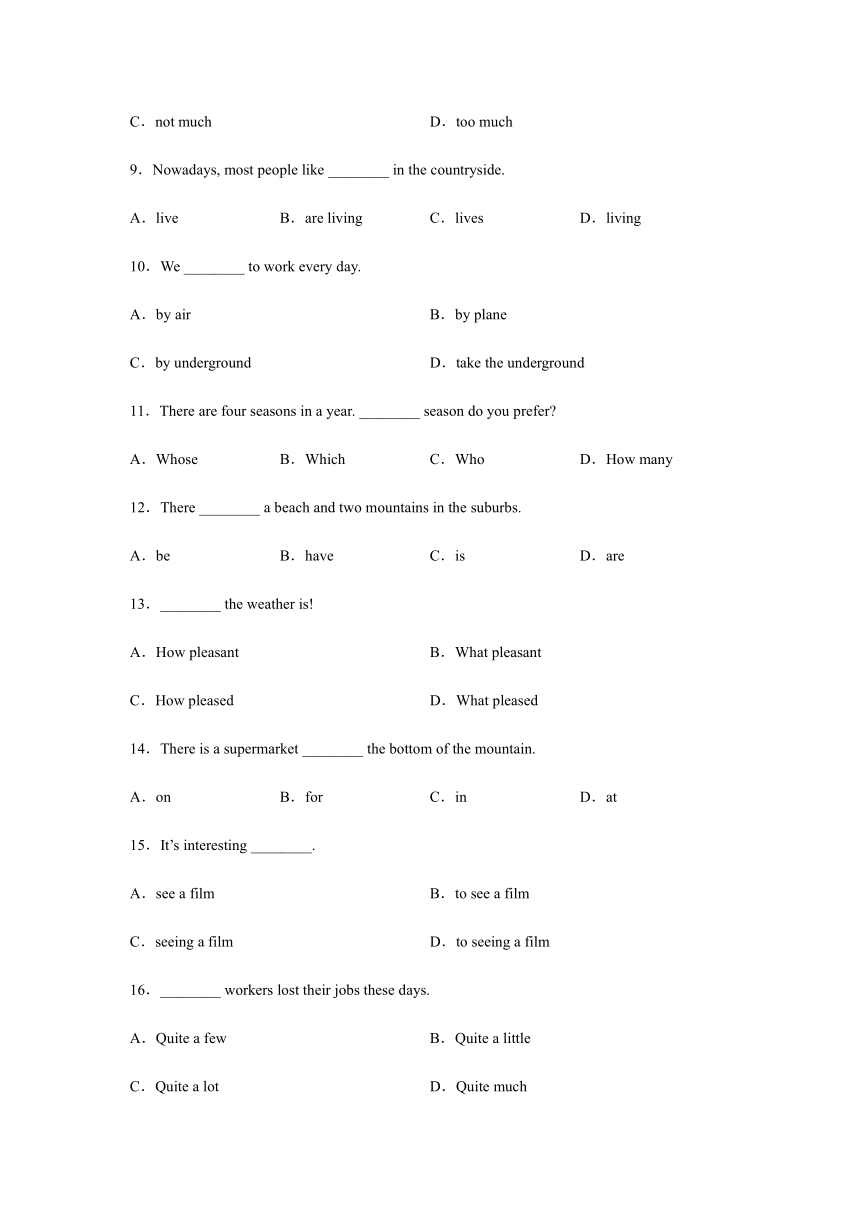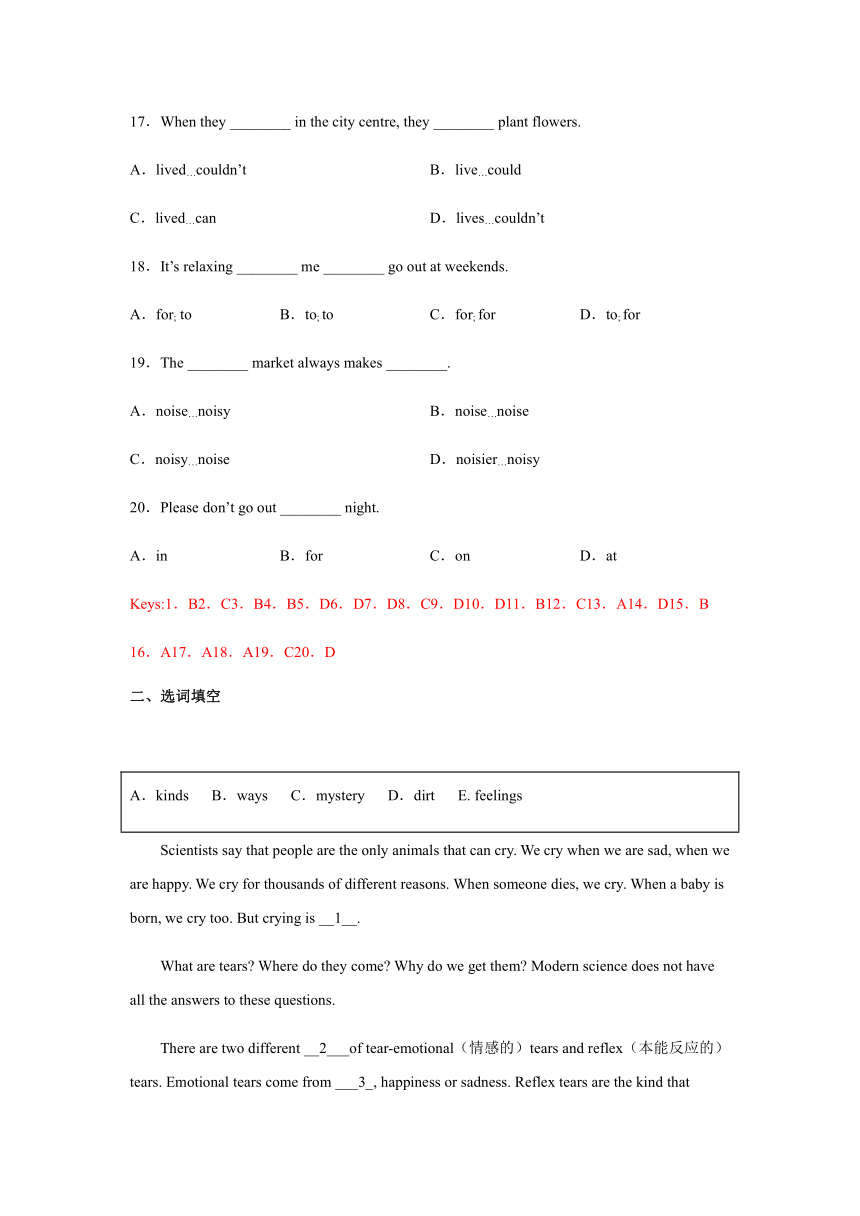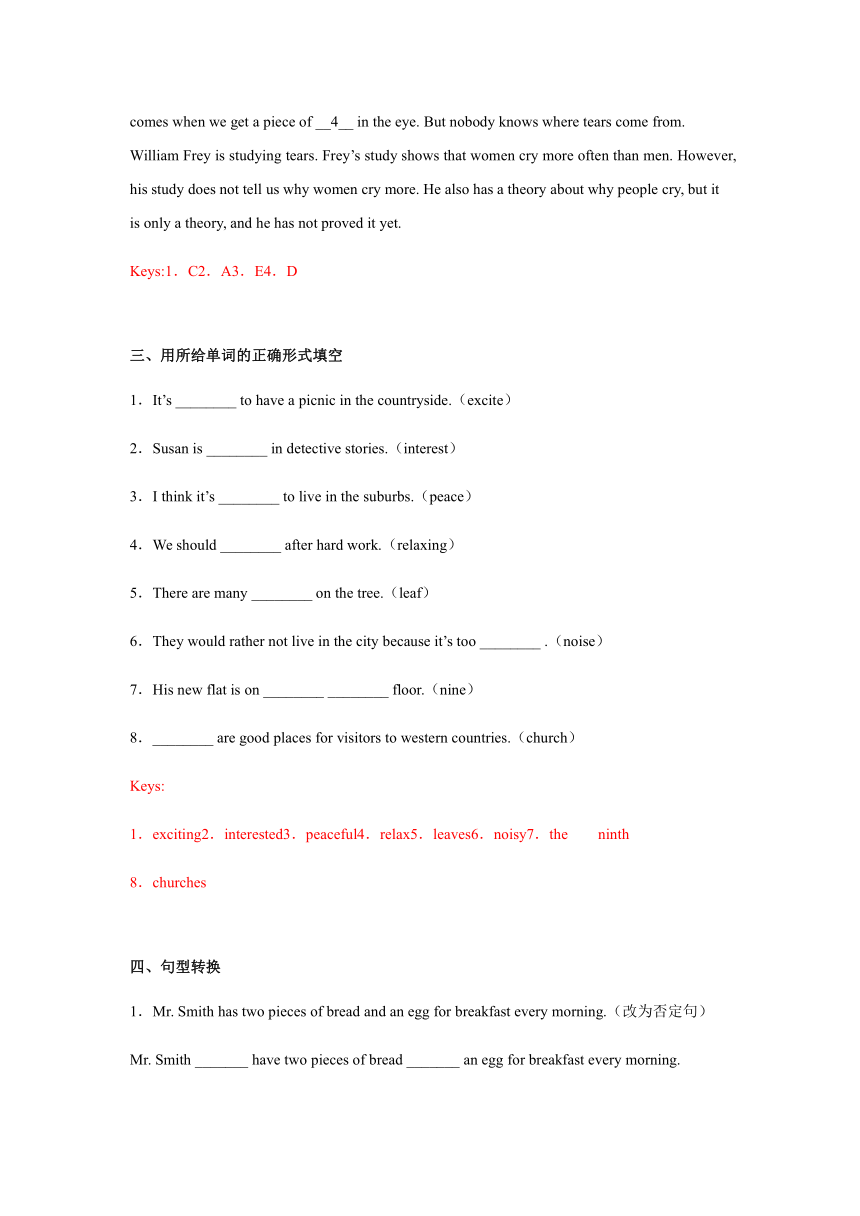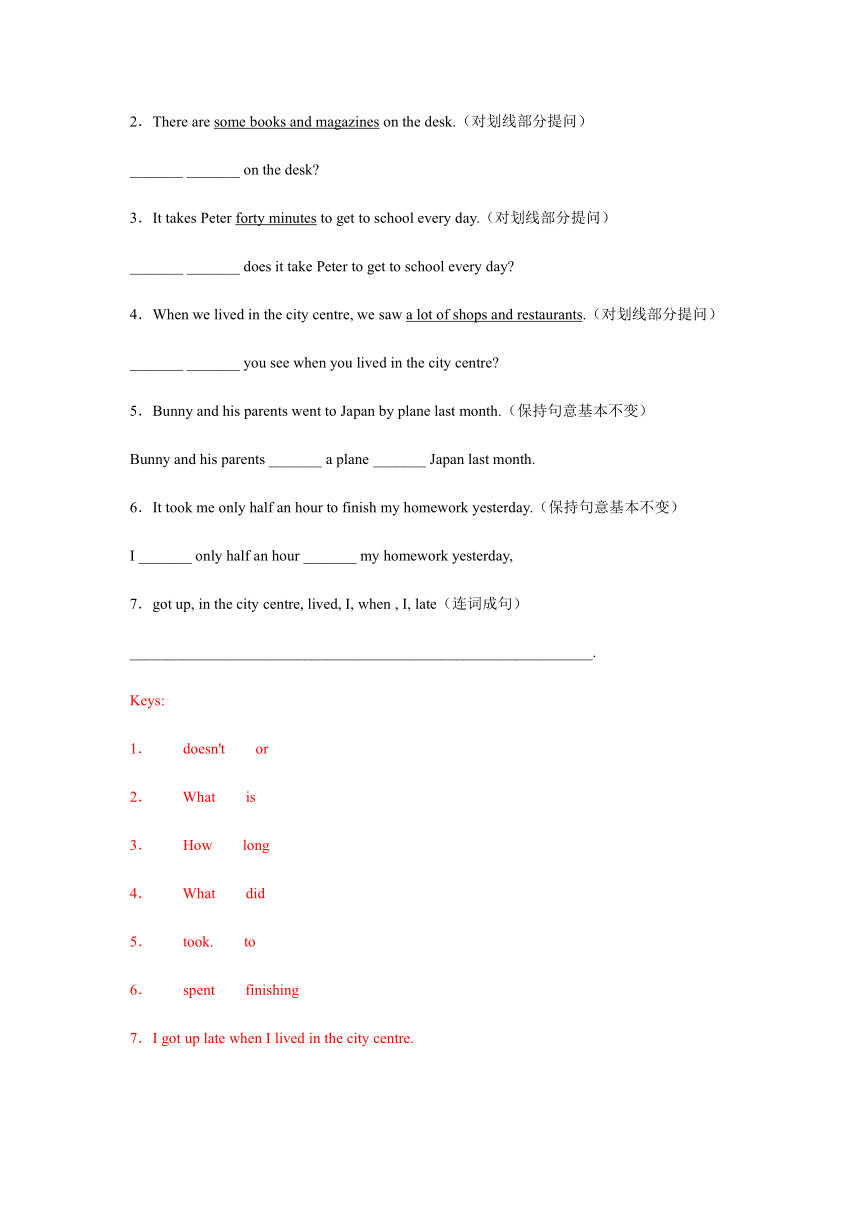Module 2 My Neighborhood Unit 6 Different places提升练习(二)(有答案)
文档属性
| 名称 | Module 2 My Neighborhood Unit 6 Different places提升练习(二)(有答案) |

|
|
| 格式 | docx | ||
| 文件大小 | 22.9KB | ||
| 资源类型 | 教案 | ||
| 版本资源 | 牛津上海版(试用本) | ||
| 科目 | 英语 | ||
| 更新时间 | 2021-07-15 00:00:00 | ||
图片预览





文档简介
上海牛津版7AU6
Different
places
提升练习(二)
一、单项选择
1.Do
you
prefer
the
city
life
________
the
suburb
life?
A.and
B.or
C.with
D.to
2.It
is
________
to
live
in
the
city
than
in
the
suburbs.
A.convenient
B.much
convenient
C.more
convenient
D.very
convenient
3.It
________
me
an
hour
to
go
to
school
by
car.
There
was
much
traffic.
A.spent
B.took
C.will
take
D.takes
4.My
Mum
________
once
a
week.
A.goes
shop
B.goes
shopping
C.goes
to
shopping
D.go
shopping
5.The
children
________
winter
uniforms
today
because
it’s
very
cold.
A.are
putting
on
B.put
on
C.is
wearing
D.are
wearing
6.What
season
is
it
in
________
picture?
A.the
forth
B.forth
C.fourth
D.the
fourth
7.________
a
windy
morning,
we
moved
into
our
new
home.
A.In
B.At
C.Of
D.On
8.There
is
________
traffic
in
the
countryside.
A.not
many
B.too
many
C.not
much
D.too
much
9.Nowadays,
most
people
like
________
in
the
countryside.
A.live
B.are
living
C.lives
D.living
10.We
________
to
work
every
day.
A.by
air
B.by
plane
C.by
underground
D.take
the
underground
11.There
are
four
seasons
in
a
year.
________
season
do
you
prefer?
A.Whose
B.Which
C.Who
D.How
many
12.There
________
a
beach
and
two
mountains
in
the
suburbs.
A.be
B.have
C.is
D.are
13.________
the
weather
is!
A.How
pleasant
B.What
pleasant
C.How
pleased
D.What
pleased
14.There
is
a
supermarket
________
the
bottom
of
the
mountain.
A.on
B.for
C.in
D.at
15.It’s
interesting
________.
A.see
a
film
B.to
see
a
film
C.seeing
a
film
D.to
seeing
a
film
16.________
workers
lost
their
jobs
these
days.
A.Quite
a
few
B.Quite
a
little
C.Quite
a
lot
D.Quite
much
17.When
they
________
in
the
city
centre,
they
________
plant
flowers.
A.lived…couldn’t
B.live…could
C.lived…can
D.lives…couldn’t
18.It’s
relaxing
________
me
________
go
out
at
weekends.
A.for;
to
B.to;
to
C.for;
for
D.to;
for
19.The
________
market
always
makes
________.
A.noise…noisy
B.noise…noise
C.noisy…noise
D.noisier…noisy
20.Please
don’t
go
out
________
night.
A.in
B.for
C.on
D.at
Keys:1.B2.C3.B4.B5.D6.D7.D8.C9.D10.D11.B12.C13.A14.D15.B
16.A17.A18.A19.C20.D
二、选词填空
A.kinds
B.ways
C.mystery
D.dirt
E.
feelings
Scientists
say
that
people
are
the
only
animals
that
can
cry.
We
cry
when
we
are
sad,
when
we
are
happy.
We
cry
for
thousands
of
different
reasons.
When
someone
dies,
we
cry.
When
a
baby
is
born,
we
cry
too.
But
crying
is
__1__.
What
are
tears?
Where
do
they
come?
Why
do
we
get
them?
Modern
science
does
not
have
all
the
answers
to
these
questions.
There
are
two
different
__2___of
tear-emotional(情感的)tears
and
reflex(本能反应的)tears.
Emotional
tears
come
from
___3_,
happiness
or
sadness.
Reflex
tears
are
the
kind
that
comes
when
we
get
a
piece
of
__4__
in
the
eye.
But
nobody
knows
where
tears
come
from.
William
Frey
is
studying
tears.
Frey’s
study
shows
that
women
cry
more
often
than
men.
However,
his
study
does
not
tell
us
why
women
cry
more.
He
also
has
a
theory
about
why
people
cry,
but
it
is
only
a
theory,
and
he
has
not
proved
it
yet.
Keys:1.C2.A3.E4.D
三、用所给单词的正确形式填空
1.It’s
________
to
have
a
picnic
in
the
countryside.(excite)
2.Susan
is
________
in
detective
stories.(interest)
3.I
think
it’s
________
to
live
in
the
suburbs.(peace)
4.We
should
________
after
hard
work.(relaxing)
5.There
are
many
________
on
the
tree.(leaf)
6.They
would
rather
not
live
in
the
city
because
it’s
too
________
.(noise)
7.His
new
flat
is
on
________
________
floor.(nine)
8.________
are
good
places
for
visitors
to
western
countries.(church)
Keys:
1.exciting2.interested3.peaceful4.relax5.leaves6.noisy7.the
ninth
8.churches
四、句型转换
1.Mr.
Smith
has
two
pieces
of
bread
and
an
egg
for
breakfast
every
morning.(改为否定句)
Mr.
Smith
_______
have
two
pieces
of
bread
_______
an
egg
for
breakfast
every
morning.
2.There
are
some
books
and
magazines
on
the
desk.(对划线部分提问)
_______
_______
on
the
desk?
3.It
takes
Peter
forty
minutes
to
get
to
school
every
day.(对划线部分提问)
_______
_______
does
it
take
Peter
to
get
to
school
every
day?
4.When
we
lived
in
the
city
centre,
we
saw
a
lot
of
shops
and
restaurants.(对划线部分提问)
_______
_______
you
see
when
you
lived
in
the
city
centre?
5.Bunny
and
his
parents
went
to
Japan
by
plane
last
month.(保持句意基本不变)
Bunny
and
his
parents
_______
a
plane
_______
Japan
last
month.
6.It
took
me
only
half
an
hour
to
finish
my
homework
yesterday.(保持句意基本不变)
I
_______
only
half
an
hour
_______
my
homework
yesterday,
7.got
up,
in
the
city
centre,
lived,
I,
when
,
I,
late(连词成句)
_____________________________________________________________.
Keys:
1.
doesn't
or
2.
What
is
3.
How
long
4.
What
did
5.
took.
to
6.
spent
finishing
7.I
got
up
late
when
I
lived
in
the
city
centre.
阅读
(A)
Five
years
ago,
I
met
her
in
a
shopping
center.
I
was
walking
through
the
shop
when
I
saw
her.
Then
she
came
back
to
my
house
with
me.
After
that,
we
became
friends.
Once
she
had
to
go
into
hospital
to
have
an
operation(手术)
on
her
leg.
I
was
worried
about
her
and
looked
after
her
every
day.
I
made
breakfast
for
her.
I
was
not
good
at
cooking,
but
she
never
complained.
I
also
helped
her
take
showers.
I
have
no
idea
why
we
can
be
good
friends,
because
she
is
quite
different
from
me.
I
like
writing,
reading
and
playing
computer
games.
But
she
loves
outdoor
activities.
She
likes
playing
balls
best.
She
also
loves
sleeping.
She
will
run
all
around
the
house
to
lick(舔)
my
face
if
someone
shouts
“Kiss
for
Dad.”
That
is
the
only
name
she
knows
me
by—Dad,
though
I
call
her
by
many
names—Pickle,
Missile
and
Little.
But
her
real
name
is
Pixar.
This
week
she
turns
seven
years
old.
21.Where
did
the
writer
met
Pixar?
A.On
the
street.
B.In
a
hospital.
C.In
a
shopping
center.
D.In
an
animal
center.
22.Pixar
was
years
old
when
the
writer
met
her.
A.two
B.five
C.seven
D.one
23.What
can
we
learn
from
the
passage?
A.Pixar
once
had
an
operation
on
her
head.
B.Pixar
doesn’t
like
playing
outside.
C.Pixar
is
the
writer’s
dog.
D.Pixar
calls
the
writer
“Dad”
every
day.
24.What’s
the
best
title
for
the
passage?
A.How
to
Make
Friends
B.My
Good
Friend
C.Strange
experience.
D.How
to
Be
a
Good
Friend
Keys:1.C2.A3.C4.B
(B)
Around
the
world,
people
have
different
ideas
about
what
good
1
are.
When
you
go
to
restaurants
in
different
parts
of
the
world,
it’s
important
to
know
the
right
and
wrong
things
to
do.
For
example,
in
China
it’s
OK
to
2
a
lot
of
noise
in
a
restaurant.
As
a
matter
of
fact,
if
a
restaurant
isn’t
noisy
and
lively,
you
may
think
there’s
something
wrong
with
it.
However,
in
many
western
countries,
restaurants
are
quiet
places.
3
,
if
a
table
is
too
loud,
other
people
who
are
eating
there
might
even
complain
to
the
owner
of
the
restaurant.
Paying
the
bill
is
also
different
form
country
to
country.
In
China,
one
person
usually
pays
for
everybody.
In
western
countries,
one
person
pays
if
he
or
she
is
one
of
the
entertaining
clients,
but
when
friends
eat
together,
they
usually
4
the
cost.
This
is
called
“going
Dutch”.
Also,
when
westerners
pay
the
bill,
they
usually
leave
some
money
for
the
waiter.
This
is
called
“leaving
a
tip”.
Leaving
a
tip
is
thought
to
be
5
.
In
the
U.
S,
it’s
common
to
leave
tips
of
10%,
15%,
or20%
of
the
bill,
which
is
decided
by
how
good
the
service
is.
Good
waiters
can
make
a
lot
of
money!
The
way
people
eat
food
is
different
in
the
world,
but
you
can
6
the
same
kinds
of
food
in
many
countries.
Chinese
and
Italian
food,
for
example,
are
popular
all
over
the
world.
1.A.signs
B.rules
C.manners
D.choices
2.A.cause
B.keep
C.hear
D.make
3.A.In
fact
B.At
most
C.In
return
D.In
all
4.A.share
B.divide
C.shoulder
D.cut
5.A.right
B.polite
C.expensive
D.cheap
6.A.invent
B.discover
C.prefer
D.find
Keys:1.C2.D3.A4.A5.B6.D
(C)
Zhang
Yang,
a
14-year-old
boy,
lives
in
the
country
with
his
family,
which
is
an
average
one.
They
e
____1_____around
12,000
yuan
a
year.
Let’s
look
at
another
example
from
the
city.
Liu
Ming,
a
16-year-old
boy,
goes
to
No.5
Middle
School
in
Shanghai.
B
____2_____
of
his
parents
are
workers,
and
their
y
_____3____
income
is
120,000yuan
each
year.
The
income
gap
b
_____4____
rural
and
urban
people
is
getting
wider.
The
yearly
income
of
a
city
family
can
be
10
times
1
____5_____
than
that
in
the
countryside.
In
these
years,
farmers
may
have
m
_____6____
nothing
or
lost
money.
It’s
easier
to
make
money
in
cities,
so
farmers
have
been
going
there
to
look
for
a
job.
That
m
____7_____
there
are
fewer
farmers
staying
at
home
to
grow
food,
that
is
a
big
problem
in
China.
Keys:1.earn2.Both3.yearly4.between5.larger6.made7.means
(D)
Pearl
and
Jane
were
good
friends
and
spent
most
of
their
time
together.
They
went
both
very
old
and
they
worried
about
their
health.
Most
of
the
time
they
talked
about
nothing
else.
They
worried
about
their
food.
Was
it
clean?
Would
it
give
them
pains
in
the
stomach?
They
worried
about
the
weather.
Was
it
too
cold
and
wet?
Would
it
give
them
pains
in
their
bones?
They
worried
about
pollution
in
the
air.
Would
it
give
them
pains
in
their
chests
and
throats?
They
worried
about
being
hurt
in
a
car
accident,
killed
in
an
airplane
crash,
getting
sick,
and
so
on.
All
they
could
think
about
was
being
ill
or
hurt.
One
day
they
went
on
a
train
journey
together.
“We’ll
need
some
food.”
Pearl
said.
“We’ll
buy
some
bananas.”
Jane
said.
“They
are
good
to
eat
and
always
clean.”
And
they
bought
two
bananas
to
eat
on
the
train.
It
was
not
long
before
they
were
hungry.
Pearl
took
out
the
bananas
and
gave
one
to
Jane.
Then
she
peeled
the
skin
of
her
banana
and
took
a
large
bite
of
it.
At
that
moment
the
train
went
into
a
tunnel.
Everything
went
black.
“Don’t
eat
your
banana!”
Pearl
shouted,
“Mine
has
made
me
go
blind.”
1.Did
Pearl
and
Jane
spend
their
most
time
together?
__________________________________________________________
2.What
did
they
worry
about?
__________________________________________________________
3.Why
did
they
worry
about
the
air
pollution?
__________________________________________________________
4.How
did
they
go
traveling
on
day?
__________________________________________________________
5.Pearl
didn’t
have
a
large
bite
of
the
banana,
did
she?
__________________________________________________________
6.Did
the
banana
make
Pearl
blind
or
not?
__________________________________________________________
Keys:
1.Yes.
2.They
worried
about
their
health.
3.Because
it
would
give
them
pains
in
their
chests
and
throats.
4.By
train.
5.Yes.
6.No.
Different
places
提升练习(二)
一、单项选择
1.Do
you
prefer
the
city
life
________
the
suburb
life?
A.and
B.or
C.with
D.to
2.It
is
________
to
live
in
the
city
than
in
the
suburbs.
A.convenient
B.much
convenient
C.more
convenient
D.very
convenient
3.It
________
me
an
hour
to
go
to
school
by
car.
There
was
much
traffic.
A.spent
B.took
C.will
take
D.takes
4.My
Mum
________
once
a
week.
A.goes
shop
B.goes
shopping
C.goes
to
shopping
D.go
shopping
5.The
children
________
winter
uniforms
today
because
it’s
very
cold.
A.are
putting
on
B.put
on
C.is
wearing
D.are
wearing
6.What
season
is
it
in
________
picture?
A.the
forth
B.forth
C.fourth
D.the
fourth
7.________
a
windy
morning,
we
moved
into
our
new
home.
A.In
B.At
C.Of
D.On
8.There
is
________
traffic
in
the
countryside.
A.not
many
B.too
many
C.not
much
D.too
much
9.Nowadays,
most
people
like
________
in
the
countryside.
A.live
B.are
living
C.lives
D.living
10.We
________
to
work
every
day.
A.by
air
B.by
plane
C.by
underground
D.take
the
underground
11.There
are
four
seasons
in
a
year.
________
season
do
you
prefer?
A.Whose
B.Which
C.Who
D.How
many
12.There
________
a
beach
and
two
mountains
in
the
suburbs.
A.be
B.have
C.is
D.are
13.________
the
weather
is!
A.How
pleasant
B.What
pleasant
C.How
pleased
D.What
pleased
14.There
is
a
supermarket
________
the
bottom
of
the
mountain.
A.on
B.for
C.in
D.at
15.It’s
interesting
________.
A.see
a
film
B.to
see
a
film
C.seeing
a
film
D.to
seeing
a
film
16.________
workers
lost
their
jobs
these
days.
A.Quite
a
few
B.Quite
a
little
C.Quite
a
lot
D.Quite
much
17.When
they
________
in
the
city
centre,
they
________
plant
flowers.
A.lived…couldn’t
B.live…could
C.lived…can
D.lives…couldn’t
18.It’s
relaxing
________
me
________
go
out
at
weekends.
A.for;
to
B.to;
to
C.for;
for
D.to;
for
19.The
________
market
always
makes
________.
A.noise…noisy
B.noise…noise
C.noisy…noise
D.noisier…noisy
20.Please
don’t
go
out
________
night.
A.in
B.for
C.on
D.at
Keys:1.B2.C3.B4.B5.D6.D7.D8.C9.D10.D11.B12.C13.A14.D15.B
16.A17.A18.A19.C20.D
二、选词填空
A.kinds
B.ways
C.mystery
D.dirt
E.
feelings
Scientists
say
that
people
are
the
only
animals
that
can
cry.
We
cry
when
we
are
sad,
when
we
are
happy.
We
cry
for
thousands
of
different
reasons.
When
someone
dies,
we
cry.
When
a
baby
is
born,
we
cry
too.
But
crying
is
__1__.
What
are
tears?
Where
do
they
come?
Why
do
we
get
them?
Modern
science
does
not
have
all
the
answers
to
these
questions.
There
are
two
different
__2___of
tear-emotional(情感的)tears
and
reflex(本能反应的)tears.
Emotional
tears
come
from
___3_,
happiness
or
sadness.
Reflex
tears
are
the
kind
that
comes
when
we
get
a
piece
of
__4__
in
the
eye.
But
nobody
knows
where
tears
come
from.
William
Frey
is
studying
tears.
Frey’s
study
shows
that
women
cry
more
often
than
men.
However,
his
study
does
not
tell
us
why
women
cry
more.
He
also
has
a
theory
about
why
people
cry,
but
it
is
only
a
theory,
and
he
has
not
proved
it
yet.
Keys:1.C2.A3.E4.D
三、用所给单词的正确形式填空
1.It’s
________
to
have
a
picnic
in
the
countryside.(excite)
2.Susan
is
________
in
detective
stories.(interest)
3.I
think
it’s
________
to
live
in
the
suburbs.(peace)
4.We
should
________
after
hard
work.(relaxing)
5.There
are
many
________
on
the
tree.(leaf)
6.They
would
rather
not
live
in
the
city
because
it’s
too
________
.(noise)
7.His
new
flat
is
on
________
________
floor.(nine)
8.________
are
good
places
for
visitors
to
western
countries.(church)
Keys:
1.exciting2.interested3.peaceful4.relax5.leaves6.noisy7.the
ninth
8.churches
四、句型转换
1.Mr.
Smith
has
two
pieces
of
bread
and
an
egg
for
breakfast
every
morning.(改为否定句)
Mr.
Smith
_______
have
two
pieces
of
bread
_______
an
egg
for
breakfast
every
morning.
2.There
are
some
books
and
magazines
on
the
desk.(对划线部分提问)
_______
_______
on
the
desk?
3.It
takes
Peter
forty
minutes
to
get
to
school
every
day.(对划线部分提问)
_______
_______
does
it
take
Peter
to
get
to
school
every
day?
4.When
we
lived
in
the
city
centre,
we
saw
a
lot
of
shops
and
restaurants.(对划线部分提问)
_______
_______
you
see
when
you
lived
in
the
city
centre?
5.Bunny
and
his
parents
went
to
Japan
by
plane
last
month.(保持句意基本不变)
Bunny
and
his
parents
_______
a
plane
_______
Japan
last
month.
6.It
took
me
only
half
an
hour
to
finish
my
homework
yesterday.(保持句意基本不变)
I
_______
only
half
an
hour
_______
my
homework
yesterday,
7.got
up,
in
the
city
centre,
lived,
I,
when
,
I,
late(连词成句)
_____________________________________________________________.
Keys:
1.
doesn't
or
2.
What
is
3.
How
long
4.
What
did
5.
took.
to
6.
spent
finishing
7.I
got
up
late
when
I
lived
in
the
city
centre.
阅读
(A)
Five
years
ago,
I
met
her
in
a
shopping
center.
I
was
walking
through
the
shop
when
I
saw
her.
Then
she
came
back
to
my
house
with
me.
After
that,
we
became
friends.
Once
she
had
to
go
into
hospital
to
have
an
operation(手术)
on
her
leg.
I
was
worried
about
her
and
looked
after
her
every
day.
I
made
breakfast
for
her.
I
was
not
good
at
cooking,
but
she
never
complained.
I
also
helped
her
take
showers.
I
have
no
idea
why
we
can
be
good
friends,
because
she
is
quite
different
from
me.
I
like
writing,
reading
and
playing
computer
games.
But
she
loves
outdoor
activities.
She
likes
playing
balls
best.
She
also
loves
sleeping.
She
will
run
all
around
the
house
to
lick(舔)
my
face
if
someone
shouts
“Kiss
for
Dad.”
That
is
the
only
name
she
knows
me
by—Dad,
though
I
call
her
by
many
names—Pickle,
Missile
and
Little.
But
her
real
name
is
Pixar.
This
week
she
turns
seven
years
old.
21.Where
did
the
writer
met
Pixar?
A.On
the
street.
B.In
a
hospital.
C.In
a
shopping
center.
D.In
an
animal
center.
22.Pixar
was
years
old
when
the
writer
met
her.
A.two
B.five
C.seven
D.one
23.What
can
we
learn
from
the
passage?
A.Pixar
once
had
an
operation
on
her
head.
B.Pixar
doesn’t
like
playing
outside.
C.Pixar
is
the
writer’s
dog.
D.Pixar
calls
the
writer
“Dad”
every
day.
24.What’s
the
best
title
for
the
passage?
A.How
to
Make
Friends
B.My
Good
Friend
C.Strange
experience.
D.How
to
Be
a
Good
Friend
Keys:1.C2.A3.C4.B
(B)
Around
the
world,
people
have
different
ideas
about
what
good
1
are.
When
you
go
to
restaurants
in
different
parts
of
the
world,
it’s
important
to
know
the
right
and
wrong
things
to
do.
For
example,
in
China
it’s
OK
to
2
a
lot
of
noise
in
a
restaurant.
As
a
matter
of
fact,
if
a
restaurant
isn’t
noisy
and
lively,
you
may
think
there’s
something
wrong
with
it.
However,
in
many
western
countries,
restaurants
are
quiet
places.
3
,
if
a
table
is
too
loud,
other
people
who
are
eating
there
might
even
complain
to
the
owner
of
the
restaurant.
Paying
the
bill
is
also
different
form
country
to
country.
In
China,
one
person
usually
pays
for
everybody.
In
western
countries,
one
person
pays
if
he
or
she
is
one
of
the
entertaining
clients,
but
when
friends
eat
together,
they
usually
4
the
cost.
This
is
called
“going
Dutch”.
Also,
when
westerners
pay
the
bill,
they
usually
leave
some
money
for
the
waiter.
This
is
called
“leaving
a
tip”.
Leaving
a
tip
is
thought
to
be
5
.
In
the
U.
S,
it’s
common
to
leave
tips
of
10%,
15%,
or20%
of
the
bill,
which
is
decided
by
how
good
the
service
is.
Good
waiters
can
make
a
lot
of
money!
The
way
people
eat
food
is
different
in
the
world,
but
you
can
6
the
same
kinds
of
food
in
many
countries.
Chinese
and
Italian
food,
for
example,
are
popular
all
over
the
world.
1.A.signs
B.rules
C.manners
D.choices
2.A.cause
B.keep
C.hear
D.make
3.A.In
fact
B.At
most
C.In
return
D.In
all
4.A.share
B.divide
C.shoulder
D.cut
5.A.right
B.polite
C.expensive
D.cheap
6.A.invent
B.discover
C.prefer
D.find
Keys:1.C2.D3.A4.A5.B6.D
(C)
Zhang
Yang,
a
14-year-old
boy,
lives
in
the
country
with
his
family,
which
is
an
average
one.
They
e
____1_____around
12,000
yuan
a
year.
Let’s
look
at
another
example
from
the
city.
Liu
Ming,
a
16-year-old
boy,
goes
to
No.5
Middle
School
in
Shanghai.
B
____2_____
of
his
parents
are
workers,
and
their
y
_____3____
income
is
120,000yuan
each
year.
The
income
gap
b
_____4____
rural
and
urban
people
is
getting
wider.
The
yearly
income
of
a
city
family
can
be
10
times
1
____5_____
than
that
in
the
countryside.
In
these
years,
farmers
may
have
m
_____6____
nothing
or
lost
money.
It’s
easier
to
make
money
in
cities,
so
farmers
have
been
going
there
to
look
for
a
job.
That
m
____7_____
there
are
fewer
farmers
staying
at
home
to
grow
food,
that
is
a
big
problem
in
China.
Keys:1.earn2.Both3.yearly4.between5.larger6.made7.means
(D)
Pearl
and
Jane
were
good
friends
and
spent
most
of
their
time
together.
They
went
both
very
old
and
they
worried
about
their
health.
Most
of
the
time
they
talked
about
nothing
else.
They
worried
about
their
food.
Was
it
clean?
Would
it
give
them
pains
in
the
stomach?
They
worried
about
the
weather.
Was
it
too
cold
and
wet?
Would
it
give
them
pains
in
their
bones?
They
worried
about
pollution
in
the
air.
Would
it
give
them
pains
in
their
chests
and
throats?
They
worried
about
being
hurt
in
a
car
accident,
killed
in
an
airplane
crash,
getting
sick,
and
so
on.
All
they
could
think
about
was
being
ill
or
hurt.
One
day
they
went
on
a
train
journey
together.
“We’ll
need
some
food.”
Pearl
said.
“We’ll
buy
some
bananas.”
Jane
said.
“They
are
good
to
eat
and
always
clean.”
And
they
bought
two
bananas
to
eat
on
the
train.
It
was
not
long
before
they
were
hungry.
Pearl
took
out
the
bananas
and
gave
one
to
Jane.
Then
she
peeled
the
skin
of
her
banana
and
took
a
large
bite
of
it.
At
that
moment
the
train
went
into
a
tunnel.
Everything
went
black.
“Don’t
eat
your
banana!”
Pearl
shouted,
“Mine
has
made
me
go
blind.”
1.Did
Pearl
and
Jane
spend
their
most
time
together?
__________________________________________________________
2.What
did
they
worry
about?
__________________________________________________________
3.Why
did
they
worry
about
the
air
pollution?
__________________________________________________________
4.How
did
they
go
traveling
on
day?
__________________________________________________________
5.Pearl
didn’t
have
a
large
bite
of
the
banana,
did
she?
__________________________________________________________
6.Did
the
banana
make
Pearl
blind
or
not?
__________________________________________________________
Keys:
1.Yes.
2.They
worried
about
their
health.
3.Because
it
would
give
them
pains
in
their
chests
and
throats.
4.By
train.
5.Yes.
6.No.
同课章节目录
- Module 1 Relationships
- Unit 1 Relationships in beijing
- Unit 2 Our animal friends
- Unit 3 Friends from other countries
- Module 2 My Neighborhood
- Unit 4 Jobs people do
- Unit 5 Choosing a new flat
- Unit 6 Different places
- Unit 7 Signs around us
- Module 3 Diet and health
- Unit 8 Growing healthy,growing
- Unit 9 International Food Festival
- Unit 10 A birthday party
- Unit 11 My food project
